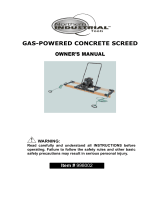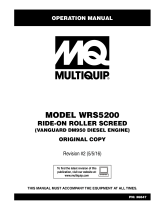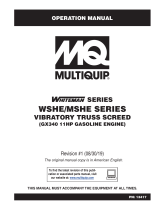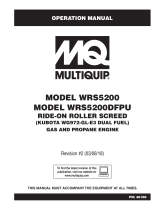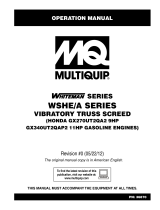
SP/HP/HPG /... Safety Information
wc_si000033gb.fm 5
2.1 Operating Safety
Notice: State Health Safety Codes and Public Resources Codes
specify that in certain locations spark arresters be used on internal
combustion engines that use hydrocarbon fuels. A spark arrester is a
device designed to prevent accidental discharge of sparks or flames
from the engine exhaust. Spark arresters are qualified and rated by
the United States Forest Service for this purpose.
In order to comply with local laws regarding spark arresters, consult
the engine distributor or the local Health and Safety Administrator.
Familiarity and proper training are required for the safe operation of
equipment! Equipment operated improperly or by untrained personnel
can be dangerous! Read the operating instructions contained in both
this manual and the engine manual and familiarize yourself with the
location and proper use of all controls. Inexperienced operators should
receive instruction from someone familiar with the equipment before
being allowed to operate the machine.
2.1.1 NEVER touch the engine or muffler while the engine is on or
immediately after it has been turned off. These areas get hot and may
cause burns.
2.1.2 NEVER use accessories or attachments that are not recommended by
Wacker. Damage to equipment and injury to the user may result.
2.1.3 NEVER leave machine running unattended.
2.1.4 NEVER operate the machine with the belt guard missing. Exposed
drive belt and pulleys create potentially dangerous hazards that can
cause serious injuries.
2.1.5 NEVER run machine indoors or in an enclosed area unless adequate
ventilation, through such items as exhaust fans or hoses, is provided.
Exhaust gas from the engine contains poisonous carbon monoxide
gas; exposure to carbon monoxide can cause loss of consciousness
and may lead to death.
2.1.6 ALWAYS wear protective clothing appropriate to the job site when
operating equipment.
2.1.7 ALWAYS wear hearing protection when operating equipment.
2.1.8 ALWAYS wear protective clothing appropriate to the job site when
operating equipment.
2.1.9 ALWAYS read, understand, and follow procedures in Operator's
Manual before attempting to operate equipment.
2.1.10 ALWAYS check that all controls are functioning properly immediately
after start-up! DO NOT operate machine unless all controls operate
correctly.
WARNING




















